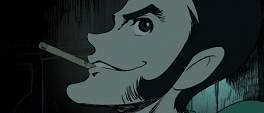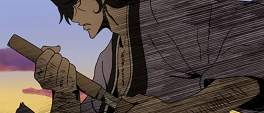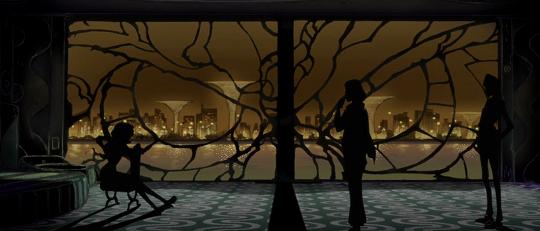The talent behind this new entry in the voluminous Lupin III canon gives it a head start when it comes to acceptance. For many, Lupin III will be the critical darling The Castle of Cagilsotro directed by Miyazaki, others the original manga series. Then there's those with no prior exposure to Lupin at all who have to accept that with Takeshii Koike (Redline) on character design, Shinichiro Watanabe (Cowboy Bebop) on music and Sayo Yamamoto (Michiko to Hatchin) in the director's chair - maybe there's something special going on with Mine Fujiko to Iu Onna.
You'd be forgiven for believing from the first three episodes that it was inventive ways of the titular Fujiko Mine appearing naked within an episode. At the risk of plunging recklessly into sexism and feminism: it's refreshing to see a female character so fully in control of her sexuality and not playing the coy and chaste purity-Sues that are the norm for most anime. It's telling though that the of the first three, the episode with the least gratuitous nudity is the most effective.
Indeed it's when an episode takes its time and enjoys the setting, the characters and the atmosphere that it's at its best; not running around with guns blazing, islands sinking and paraphernalia parading across into view. Steeped in reverence to early animation, the visual style is difficult to miss and what it lacks in fidelity with the charcoal shadows and pop-up book backgrounds it more than compensates with character. The director's previous experience with the similarly eye-pleasing Michiko to Hatchin suffered from a precipitous plunge in visual quality as the lacklustre story progressed.
Whether the same will happen here is still up for debate but so far the journeys into the lives of Lupin's erstwhile crew has been strong enough not to raise the question of an overarching story. Taken as short character studies they work due to the strength of personalities, no more so than Fujiko's who plays the femme fatale wonderfully: pragmatic and daring but mysterious and alluring. She certainly shows previous queens of the archetype such as Faye Valentine (Cowboy Bebop) how to make the most of it.
Like Cowboy Bebop, Mine Fujiko to Iu Onna is in love with the noir, gangster atmosphere from the 1940's and 50's Hollywood films. It's a wonderfully evocative genre and one which seems to bring out the best in a series as Baccano! can probably attest to. Also like Bebop, there is always a place for a series which features and is written for adults and not adolescents.
Unfortunate that some of the latter has bled into the former with the copious, unnecessary nudity but conversely, the latter's reckless abandon means scenes never stay po-faced for long before someone is slicing bullets (a likely unintentional nod to the lunacy in Black Lagoon) or putting rockets on a bodhisattva. If the first two episodes were raucously entertaining, and the third episode is hopefully a sign of things to come - measured, comfortable and subtle - then the remainder of this series will be utterly unmissable.





